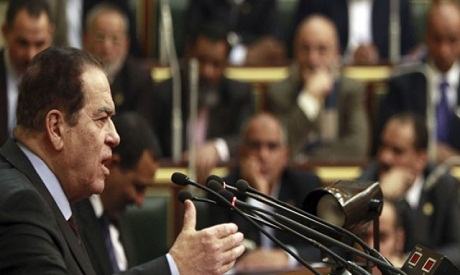 Intensive efforts have been exerted in recent days to put an end to the three-month-long showdown between the government of prime minister Kamal El-Ganzouri and the Islamist-dominated parliament.
Intensive efforts have been exerted in recent days to put an end to the three-month-long showdown between the government of prime minister Kamal El-Ganzouri and the Islamist-dominated parliament.
The showdown erupted after MPs – especially those belonging to Muslim Brotherhood's Freedom and Justice Party (FJP) – sharply attacked El-Ganzouri's policy statement, delivered before parliament on 26 February. They asked El-Ganzouri to resign or face a vote of no confidence in his government, because of its poor performance and unrealistic policy statement.
Parliament speaker Saad El-Katatni told MPs that a meeting between a parliamentary delegation and leaders of the ruling Supreme Council of Armed Forces (SCAF) on Sunday has reduced the tension with El-Ganzouri's government.
According to El-Katatni, the leaders of the SCAF promised that a cabinet reshuffle would be undertaken within 48 hours.
“This could mean changing the government as a whole or introducing a limited cabinet reshuffle,” said El-Katatni.
According to parliamentary insiders, the government of Kamal El-Ganzouri would be renamed “a caretaker government” instead of “a national salvation government.”
"Changing the name to a caretaker government would mean that parliament cannot withdraw confidence from it," said independent MP Mostafa Bakri, who was part of the parliamentary delegation.
It is expected that the government will submit to parliament this week its draft budget and plan for the fiscal year 2012/2013, to be discussed by parliament's budget committee.
Minister of International Cooperation and Planning Fayza Abul-Naga met with El-Katatni last week to discuss the measures necessary for discussing this budget before parliament.
"The constitutional declaration does not impose a certain time on the government to refer the budget to parliament, but it should be discussed in parliament two months before the end of its session," said Abul-Naga.
On Monday, parliament refrained from discussing three interpellations submitted against the government of Kamal El-Ganzouri. The reason was that the three questions are directed at Minister of Agriculture Mohamed Ismail, who left for the United Arab Emirates to attend an agricultural conference there.
Observers, however, say that "this was not the real reason, because the agriculture minister knew in advance that he had to come to present on Monday, to respond to the three interpellations."
It was supposed that after discussing these interpellations, parliament would withdraw confidence from the government. The three interpellations dealt with corruption in distributing lands among young university graduates.
In another development, parliament refused to open a long discussion about the tragic events which left nine dead in the Cairo district of Abbasiya. The assembly was divided into two camps, with independent and non-FJP MPs rejecting any kind of condemnation of the SCAF for the death of the nine citizens.
A delegation from most political parties plus independents – with the exception of FJP MPs – decided to visit the headquarters of the Ministry of Defence on Monday to express their support for and solidarity with the SCAF. Parliament also failed to lay any blame on the interior ministry, thus reducing tension with the government.
The delegation from the People's Assembly also discussed a number of thorny constitutional issues with the SCAF. El-Katatni said parliament was dismayed by the announcements of certain SCAF leaders that “unless a new constitution is drafted ahead of presidential elections, a complementary constitutional declaration will be issued to set in clear terms the powers and responsibilities of the new president.”
But the parliamentary delegation refused the SCAF's proposal of a complementary declaration that would give the president the right to dissolve parliament in return for granting parliament the right of withdrawing confidence from the government.
Meanwhile, on Monday night the parliament's constitutional and legislative affairs committee will hold its final hearing before it drafts the criteria for the new constituent assembly, which will be tasked with writing the new constitution.
El-Katatni said the new criteria would be issued this week and that a new joint meeting of the two houses of parliament – the People's Assembly and Shura Council – would be held to endorse these criteria.
It remains to be seen, however, whether these criteria will gain the support of secular forces, who accused Islamist parties of dominating the previous constituent assembly.



